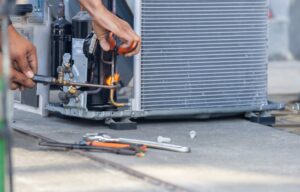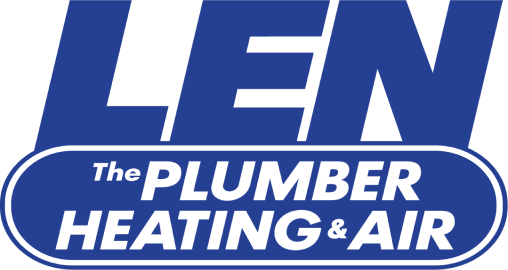How Do Heat Pumps Work?
 As heat pumps rapidly gain popularity in Virginia and across the United States, homeowners may find themselves even more intrigued by this traditional HVAC alternative.
As heat pumps rapidly gain popularity in Virginia and across the United States, homeowners may find themselves even more intrigued by this traditional HVAC alternative.
From their dual heating and cooling power to their environmental benefits, heat pumps offer many unique advantages to Northern Virginia homeowners that can improve overall comfort while reducing energy bills.
In this article, the HVAC experts at Len The Plumber Heating & Air offer the heat pump explained: what it is, how it works, the various types on the market, pros and cons, and what to look for when considering installation.
What Is a Heat Pump, in Simple Terms?
A heat pump is a highly energy-efficient HVAC system that provides both heating and cooling in a single system. Unlike a traditional system like a furnace, a heat pump does not generate heat; instead, it transfers it either into or out of your home to create a consistent temperature that ensures year-round comfort.
What Are the Key Components of a Heat Pump System?
A heat pump has many key components that each play a role in the way that heat pumps move heat:
- Refrigerant: Refrigerant is the fluid that absorbs and releases heat as it changes between a liquid and a vapor.
- Compressor: The compressor is the system that pressurizes and circulates the refrigerant throughout the system.
- Indoor and outdoor coils: The indoor and outdoor coils of a heat pump act as evaporators and condensers, though which role they play depends on whether the system is heating or cooling. The evaporator coil absorbs heat, and the condenser coil releases it.
- Reversing valve: The reversing valve on a heat pump switches the direction that refrigerant flows so that the system can switch between heating and cooling.
- Thermostatic expansion valve: The TXV controls the flow of refrigerant to the coils to maintain maximum efficiency.
- Air handlers or ductwork: Either indoor air handlers or a system of ductwork will move the heated or cooled air throughout your home.
How Does the Heating and Cooling Cycle Work?
A heat pump’s heating and cooling cycles are essentially the same, just working in reverse. During the winter months, the refrigerant cycle will absorb heat outside (even in low temperatures), compress it to raise its temperature, and release that heat into your home. In the summer, the system absorbs heat from inside your home and goes through the same refrigeration cycle to release it into the outdoors.
While heat pumps are now made to work efficiently in extreme cold, they can still frost or ice over. In these instances, the defrost cycle will thaw the coils to keep the system working properly.
What Types of Heat Pumps Are There?
When comparing air source vs ground source heat pumps, there are many things to consider:
- Air-source heat pumps are the most common type of heat pump that draws heat from the outdoor air. They are easier to install than a ground-source heat pump and are less expensive. However, efficiency on these systems can drop in temperatures below 35 degrees Fahrenheit.
- Ground-source or geothermal heat pumps are options for homeowners open to a larger investment that offers long-term savings. They heat from the soil and through underground pipes. While these systems are highly efficient and offer stable year-round performance, they require significant yard space for installation.
How Efficient Are Heat Pumps? What Affects Their Efficiency?
As one of the most energy-efficient home comfort systems in the industry, heat pump efficiency is top-tier. Their cooling efficiency is measured with a SEER2 (Seasonal Energy Efficiency Ratio 2) in the mid-to-high teens, making them a highly efficient cooling option.
For heating, efficiency is measured through the Coefficient of Performance (COP) concept, which compares heat delivery to electricity used. Most heat pumps have a COP of 3.0-4.0 in mild temperatures, meaning 3-4 units of heat are delivered per 1 unit of electricity consumed. However, this is highly impacted by the climate. In freezing temperatures, COP drops to 1.5-2.5.
Many factors can affect the efficiency of your heat pump, including:
- Whether your system is properly sized
- The quality of your home’s insulation
- The condition of your ductwork
- The quality of the installation
What Are the Pros and Cons of Using a Heat Pump in Northern Virginia?
There are many benefits of heat pumps in Northern Virginia homes, including:
- Dual heating and cooling power
- Lower energy bills
- Environmentally-friendly performance
- Simplified maintenance
The cons to these systems include:
- Less efficient performance in extreme cold
- High upfront costs
- Potential need for backup heating
What Should Homeowners Consider Before Installing a Heat Pump?
To ensure that a heat pump is the right choice for your Northern Virginia home, consider the following:
- Local climate: Homeowners who are looking for powerful and efficient heat in below-freezing temperatures may need backup heat for their heat pump.
- Home condition: Issues like old or insufficient insulation and damaged or leaking ductwork can compromise the energy efficiency of your new heat pump.
- Size and models: Ensure that your heat pump is the proper size for your home to ensure maximum efficiency, and compare various models to get the system that best meets your needs.
- Incentives and rebates: Many state and federal incentives are available to homeowners who make the energy-efficient upgrade to a heat pump.
- Maintenance needs: Because a heat pump acts as your heating and cooling, it will need two tune-ups per year to ensure that it is working properly.
Frequently Asked Questions About Heat Pumps
Can a heat pump really work when it’s very cold outside?
How does a heat pump compare cost-wise to a traditional furnace or AC?
What maintenance is required for a heat pump?
- Regularly changing filters
- Scheduling seasonal check-ups in spring and fall
- Keeping the outdoor unit clear of snow or debris
- Verifying refrigerant levels
What size heat pump do I need for my Northern Virginia home?
Are there rebates or incentives available in Virginia for installing heat pumps?
Request Heat Pump Installation in NOVA
If you’re ready to install a heat pump in your Northern Virginia home, turn to the team at Len The Plumber Heating & Air. Our experienced technicians offer a high-quality experience and can help homeowners select the best system for their home. With 25 years of industry experience, our local team is always available and always reliable with upfront estimates and same-day service seven days a week.
Call Len The Plumber Heating & Air today to schedule heat pump installation in your home.
From Len The Plumber Heating & Air
 Coupons
Coupons 

